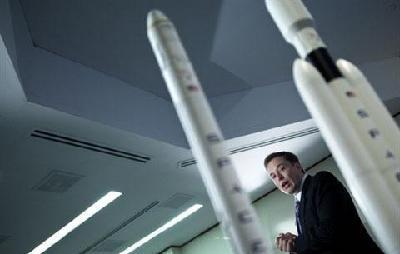This is the VOA Special English Technology Report.
An American space company says a powerful new rocket should be ready for a test launch by the end of next year. The company is Space Exploration Technologies, or SpaceX. Its new rocket is called the Falcon Heavy.
Company officials say it will be able to transport satellites or spacecraft weighing up to 53 metric tons into orbit. Fifty-three metric tons is 117,000 pounds. That load weight is double the capacity of NASA space shuttles. The space agency is retiring its shuttles after 30 years.
Elon Musk is the chief executive officer of SpaceX.
ELON MUSK: "One hundred seventeen thousand pounds is more than a fully loaded Boeing 737 with 136 passengers, luggage and fuel in orbit. So that is really, really humongous. It's more payload capability than any vehicle in history, apart from the Saturn Five."
NASA used Saturn Five rockets during its Apollo and Skylab programs in the 1960s and 70s. A Saturn Five launched the Apollo 11 mission that landed the first humans on the moon in 1969.
The rockets were removed from service in 1973. But they remain the most powerful ever built.
Elon Musk says the Falcon Heavy will be the second most powerful rocket ever. He says it was designed to do more than carry satellites and other equipment into space. He says the rocket was designed to meet NASA's ratings for human flight safety. So it could someday be used to carry astronauts and other travelers into space.
Mr. Musk says the Falcon Heavy could also be used for missions like carrying a robotic lander to collect samples from Mars.
ELON MUSK: "It has so much capability, so much more capability than any other vehicle, that I think we can start to contemplate missions like a Mars sample return, which requires a tremendous amount of lift capability because you've got to send a lander to Mars that still has enough propellant to return to Earth."
The first launch is planned from the company's launch site at Vandenberg Air Force Base in California. A launch from Cape Canaveral, Florida, is expected in late 2013 or 2014.
In time, SpaceX hopes to launch ten Falcon Heavy rockets a year. It says the rocket should reduce launch costs to about 2,000 dollars a kilogram. That is about one-tenth the cost of carrying loads into orbit on a space shuttle.
SpaceX already has a billion-and-a-half-dollar deal with NASA to use a smaller rocket to transport cargo to the International Space Station. The rocket is the Falcon 9, and the deal is for after the two last shuttles -- Endeavour and Atlantis -- are retired this year.
And that's the VOA Special English Technology Report, written by June Simms and Jessica Berman. I'm Steve Ember.
humongous: very big 巨大的;龐大的
Space shuttle program nears an end
Astronaut twins rendezvous in space
Remembering the X-15, America's first step in manned space flight
Shuttle Discovery launches mission to space station
(來(lái)源:VOA 編輯:崔旭燕)
